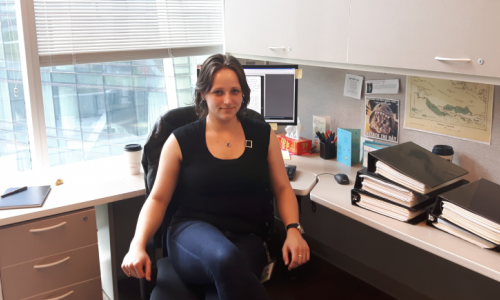
I strongly believe that when it comes to getting a job, luck is not created out of thin air. When it comes to getting a job, think of the words of Roman Philosopher, Lucius Annaeus Seneca:
“Luck is a matter of preparation meeting opportunity”
What does this mean in the context of job hunting? No matter what kind of job you are looking for after graduation, it is important to start thinking now about how to prepare yourself for your future job. The following article will look at four tips to prepare yourself for a future career opportunity.
1. Being Flexible and Taking Risks
Being successful often means being open to new opportunities even if the situation is not ideal. For example, many Co-op students often limit themselves to applying to jobs within the Vancouver area. As a result, valuable national and international opportunities are missed that could have opened doors to future job opportunities. One Co-op student who decided to take a risk and be flexible is student Samantha Grandinetti. Samantha was offered an 8 month Co-op work term as a Project Coordinator on the Internal Beta-Testing Team at Blackberry.
“Looking back on this decision two years later, I can honestly say it was the best decision I ever made. The tech industry is exciting, thriving, and innovative – meaning that every day I worked with new people, new technology and tackled new problems. I was hungry to learn everything I could from navigating the complex internal directory, to learning all about telecom infrastructure to forgetting everything I knew about embellishment from my academic writing style and producing direct, highly precise business memos and emails. The learning curve was steep and I loved every step I took towards conquering my role and supporting my team mates.”
The reality is that a majority of the career risks you take at the university level will not ruin your life or change it. Like in Samantha’s case, it was a risk taking a job in Ottawa; she had to leave friends and family while taking on a role at a large company and be able to perform to her full potential without her usual support system. However, in Samantha’s case, the experience she gained outweighed the cons.
2. Being Curious
Did you know that 80% of jobs today are not advertised? That being said, in order to get a job you need to be curious about the various opportunities that are available. What this means is creating those opportunities for yourself, and not always applying through a job posting.
Informational Interviews
Being curious about how an industry, company or specific job works, is a great place to start. Informational interviews provide students with the opportunity to learn more about a specific industry, company or job in order to see if it would be something they would be interested doing full time. By sitting down with a company and asking the right questions, you a) see first-hand if working for that company is something you would enjoy b) gain insight into that company, industry and job that you could use for future applications c) have an opportunity to gain connections within your field of study that can be valuable in the future.
Participate in Activities outside your faculty
By allowing yourself to be curious about activities and opportunities outside of your faculty that interest you, you are allowing yourself to a) grow your social network, which could help when drawing on connections for work and b) explore other opportunities that you could be interested in.
3. Being Persistent
Last, continue to persevere even though your hard work is not getting you any results. I know when I first was looking for a co-op job in my first semester of looking for work I didn’t get a single interview offer. The key to getting a job is through the quantity and the quality of applications that you send out. If you keep persevering and continue to send a number of quality applications, you are eventually going to get a positive response.
To conclude, getting a job does not happen by snapping your fingers. It takes hard work, determination in order to prepare and create opportunities for you to succeed. By preparing accordingly and working hard you will begin to create your own luck.
Beyond the Blog
-
Get prepared with Informational Interview Questions














